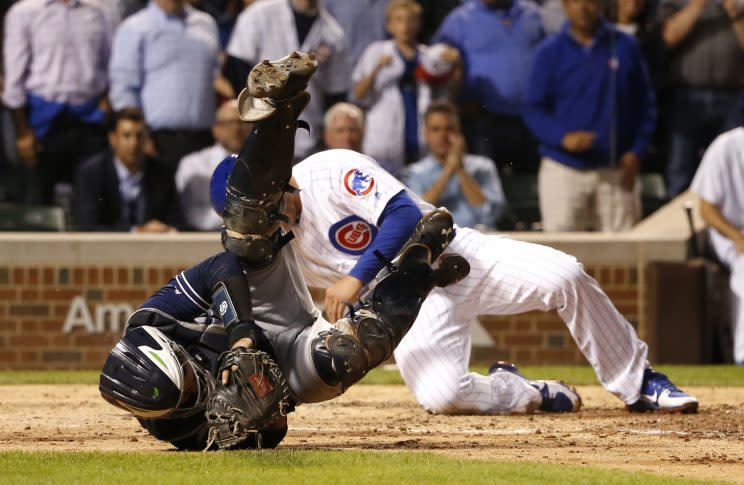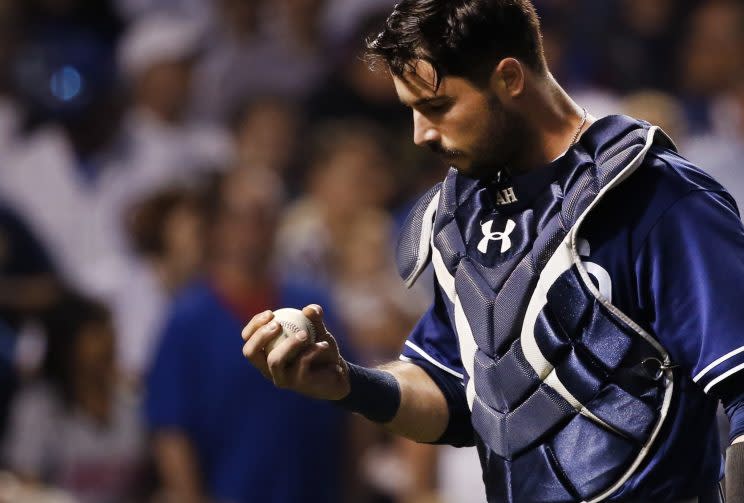Should MLB fix home plate collision rule after Anthony Rizzo's slide?
In 2014, Major League Baseball instituted the “Buster Posey rule” aimed at decreasing both the amount and the severity of home plate collisions. That rule may need an “Anthony Rizzo Amendment” in 2017.
The Chicago Cubs first baseman found himself in hot water after running into San Diego Padres catcher Austin Hedges during Monday’s game. The ball beat Rizzo to the plate by a few steps, and instead of sliding away from Hedges, he opted to run into him. Hedges held onto the ball for the out, but had to leave the game with a thigh injury.
[Fantasy Football is open! Sign up now]
The league decided to take a closer look at the play following post-game comments by Padres manager Andy Green. Green believed Rizzo’s actions were an “egregious” violation of the rule.
Joe Torre, MLB’s Chief Baseball Officer, agreed with that assessment and told Rizzo as much. The league, however, did not take it any further. Rizzo was not fined or suspended for the play. While the Padres may not have agreed with the ruling, they accepted it.
We here at The Stew aren’t willing to do that. The “Buster Posey rule” is far from perfect. It’s reliant on the umpire’s interpretation, meaning the same play could result in a different ruling based on whoever is behind the plate. On top of that, there are no defined punishments for violating the rule.
In light of the Rizzo ruling, we asked our experts how they would change the “Buster Posey rule” moving forward. We may not have all the right answers, but we think we have some solid ideas.

TAKE A PAGE FROM THE NBA’S RULEBOOK
I think by now everyone has a pretty good grasp on how the “Buster Posey rule” works. But if MLB wants the players and the fans to respect the rule, they have to either enforce it or make a better effort to explain why they’re not taking action. With that in mind — and it pains me to even reference NBA officiating or rules — the Buster Posey rule clearly needs structure in line with how the NBA handles flagrant fouls.
All we’ve heard in wake of the Anthony Rizzo-Austin Hedges collision is that Rizzo was informed he violated the rule (and he clearly did) but wouldn’t be fined or suspended. To leave it at that only serves to chip away at the integrity of the rule and those charged with enforcing it, while potentially leaving “punishment” in the hands of the players.
If the league released a statement saying they’ve reviewed Rizzo’s slide, ruled it a non-flagrant violation and outlined future punishments for first-time offenders, at least we have clarity. Then, the league could tell us what will happen if Rizzo violates the rule again in the same manner. Same thing if the catcher incidentally creates contact or does so with apparent malicious intent.
One thing I’ll give MLB credit for is consistently restraining from suspending players since no violation has clearly ventured into malicious territory yet. But I feel like structure and clarity would lead to a more consistent interpretation and enforcement of the rule. (Mark Townsend)
BE MORE SPECIFIC … ABOUT EVERYTHING
I’m fine with Rizzo not getting suspended because the rule is more about whether a player is safe or out. But I think that speaks to how this rule can be refined — because let’s face it, the entire thing is confusing. So what would I change? Just make everything more clear. Make the punishments clear. Let’s not leave it ambiguous enough that we only see an impact if a star catcher gets hurt. Make the rule itself easier to understand. Let’s not leave it so even the players and coaches on the field aren’t totally sure how it works. If we want to make the rule effective, it starts with clear definitions. (Mike Oz)

DON’T CHANGE A THING
I think I’m in the minority here, but I’m not sure I’d change anything. In baseball, we’re used to things being black and white. A player is safe, or they’re out. Very few things are ambiguous, which is why this rule is annoying: it’s ambiguous. And maybe that’s the point.
A rule to outlaw something is meant to punish those who violate it, but to also cut down on the behavior altogether. That’s what this collision rule did. Every time I see a catcher set up at the plate as a runner barrels down the third base line, I think of this rule. It’s changed a lot in baseball. Runners go out of their way not to collide with the catcher (see Andrew McCutchen and Chris Coghlan’s backstop-vaulting leaps to home plate). The rule codified something important: collisions are bad. Yes, they’ve been part of baseball forever, but that doesn’t mean they’re good. They’re harmful, even if they’re sometimes necessary. Which is why the rule is fine the way it is.
Baseball has necessarily adapted to it, but the rule still allows for exceptions (and even outright violations). Trying to tease out more specificity and add more punishment will only muddy the waters of a rule that’s already pretty opaque. (Liz Roscher)
START FINING PLAYERS AND TEAMS
There’s no perfect solution here. In every instance, you’re going to be left with a situation that is ultimately subject to someone’s interpretation. While hard rules would at least establish a baseline, I do think there has to be some room for intent and judgement. Think about hard hits in the NFL. On some plays, it’s obvious. On others, guys have no time to react. Both are punished equally and that stinks. That’s what we’re dealing with here. Every situation is unique.
At the same time, there’s no punishment for breaking the rule, and that’s a problem. Rizzo received a slap on the wrist here even though he was in violation of the policy. There’s no incentive for him to ease up next time he’s barreling home as the catcher turns to make the tag. If Monday’s incident cost Rizzo some money, though, maybe things would be different next time.
I would be in favor the league fining players or teams found in violation of the rule. Maybe that money could go to a charity of the player’s choice or something. That way, there’s at least a punishment for violating the rule.
That’s as far as I’m willing to go, though. I do think suspensions should be considered if the player acts maliciously, but we haven’t seen evidence of that just yet. And I would hate for MLB to institute something similar to a three-strike policy only to see one player miss time because they were involved in more than one split second play that went against the rule.
A simple slap on the wrist seems weak. A fine speaks a bit louder. (Chris Cwik)
More MLB coverage from Yahoo Sports:
– – – – – – –
Chris Cwik is a writer for Big League Stew on Yahoo Sports. Have a tip? Email him at christophercwik@yahoo.com or follow him on Twitter! Follow @Chris_Cwik

